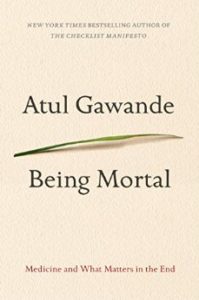 Physician Atul Gawande has written a powerful, moving book on aging and death. Being Mortal provides a logical, clear-eyed view of dying and what is important.
Physician Atul Gawande has written a powerful, moving book on aging and death. Being Mortal provides a logical, clear-eyed view of dying and what is important.
Gawande emphasizes the importance of questions we ask someone whose death is in the near future. Ask “If time becomes short, what is most important to you?” Most people will want to be relieved of pain, to be among those they love, and at peace. Many doctors tend to try to prolong life, even though life has ceased to be one of quality. Studies have shown that people in hospice, where patients are kept comfortable and without extensive treatment, live longer and happier.
Older patients and their families often feel desperate in the face of terminal illnesses; they’ll try anything to prolong life, whatever the improbability, the misery, or the cost. Instead, we should consider how to face mortality and preserve the essence of a meaningful life. When we ask our loved ones what they want, what is most important, what are their worries, the answers and the steps to be taken become clear.
As health conditions worsen, mounting crises often create a series of temporary rescues. Gawande terms this ODTAA, One Damn Thing After Another. Perhaps a better way to face these crises is to explore the idea of living for the best possible day today instead of sacrificing time now for time later.
The science of medicine is to enable well-being. Whenever serious illness or injury strikes, vital questions should be asked: What is your understanding of this condition and the likely outcome? What trade-offs are you willing or not willing to make? Being Mortal gives readers the means and confidence to raise and answer these questions.
Although the subject matter is serious, the book is written in an encouraging, inspiring way, sometimes even with humor. Atul Gawande has left a lasting impression on how I look at terminal illness and the importance of preparedness. Being Mortal is a worthy addition to our personal library.


I loved this book and its helpful advice for everyone, but especially caretakers of terminal or aging family members. The statistics were fascinating, including the one you talked about at people actually living longer with palliative care versus the “One Damn Thing After Another” approach. I’m saddened that geriatric doctors are on the wane. How fortunate for those who can find a caring physician who listens with more than a stethoscope. Thanks for sharing your review.
Thank you for your enlightening comments, Nancy, and the good points you bring up. The book points out many things lacking regarding end-of-life situations. It’s a book both my husband and I took very seriously.
Mary, you have described the book which has been on my list of books to read for a long time. We need to face this issue in emotional as well as rational manner. Thank you for discussing this topic.
The author is so well spoken. Despite the grim subject, there is also humor in his writing, which I appreciated.
Mary, what an interesting book We just lost a cousin to COPD. He was in hospice. This looks like a great book that gets to the heart of life in its final moments. Carmen
It really is a book that everyone should read. At some time or another, we will all face this situation, either with our own lives or with those we love.
Makes a reader come face to face with the truth.
It does, Judith. I appreciate the author’s honesty, but still it’s easy to read, despite the grim subject.